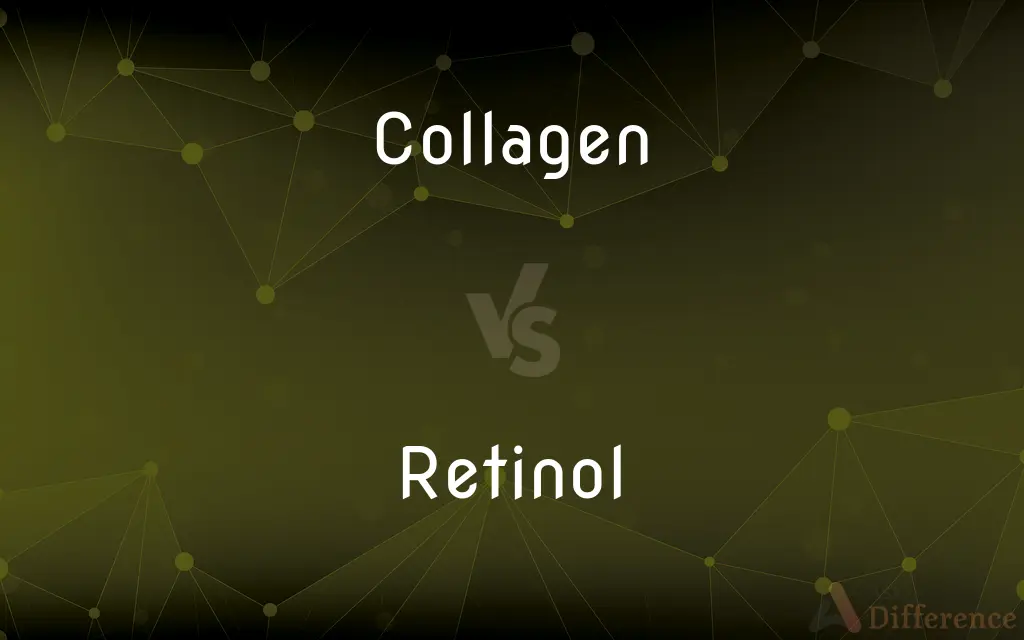Collagen vs. Retinol — What's the Difference?
By Tayyaba Rehman & Maham Liaqat — Updated on March 16, 2024
Collagen is a key protein in the body's connective tissues, whereas retinol, a form of Vitamin A, is used in skincare to reduce aging signs.

Difference Between Collagen and Retinol
Table of Contents
ADVERTISEMENT
Key Differences
Collagen is a natural protein found abundantly in the body, providing structural support to skin, bones, and connective tissues. On the other hand, retinol is a potent derivative of Vitamin A, acclaimed for its ability to accelerate skin renewal and improve skin texture by promoting collagen production.
While collagen is integral for maintaining the skin's elasticity and firmness, retinol works primarily on the skin's surface, targeting fine lines, wrinkles, and uneven skin tone by enhancing cellular turnover.
Collagen supplements and creams aim to replenish the body's natural collagen levels, which decrease with age, whereas retinol products focus on stimulating the skin's natural processes to repair and rejuvenate itself.
Unlike collagen, which can be ingested or applied topically to support skin health from within or on the surface, retinol is used exclusively in topical skincare formulations due to its direct action on skin cells.
Collagen's benefits extend beyond skincare, supporting joint health and overall structural integrity of the body, while retinol's benefits are primarily seen in its anti-aging and complexion-enhancing properties on the skin.
ADVERTISEMENT
Comparison Chart
Primary Function
Structural support in the body
Promotes skin renewal
Usage
Supplements, creams
Topical skincare products
Benefits
Skin elasticity, joint health
Reduces wrinkles, improves texture
Natural Source
Body’s connective tissues
Vitamin A derivative
Action Mechanism
Replenishes body's collagen
Accelerates cellular turnover
Compare with Definitions
Collagen
A protein responsible for skin elasticity and strength.
Collagen creams aim to improve skin firmness.
Retinol
Can cause sensitivity to sunlight.
It's important to use sunscreen when applying retinol products.
Collagen
Found in bones, muscles, and blood.
Collagen provides the scaffolding for our body's structure.
Retinol
A form of Vitamin A used in skincare.
Retinol creams help reduce the appearance of wrinkles.
Collagen
Can be derived from food or supplements.
Bone broth is a natural source of collagen.
Retinol
Used to treat acne and aging signs.
Retinol is effective in clearing acne-prone skin.
Collagen
The main component of connective tissues.
Collagen supplements are popular for their joint health benefits.
Retinol
Promotes skin cell turnover.
Regular use of retinol can reveal fresher, younger-looking skin.
Collagen
Integral for wound healing.
Collagen plays a crucial role in the body's healing process.
Retinol
Stimulates collagen production.
Retinol indirectly boosts skin firmness by enhancing collagen synthesis.
Collagen
Collagen () is the main structural protein in the extracellular matrix found in the body's various connective tissues. As the main component of connective tissue, it is the most abundant protein in mammals, making up from 25% to 35% of the whole-body protein content.
Retinol
Retinol, also called vitamin A1, is a vitamin in the vitamin A family found in food and used as a dietary supplement. As a supplement it is used to treat and prevent vitamin A deficiency, especially that which results in xerophthalmia.
Collagen
The main structural protein found in skin and other connective tissues, widely used in purified form for cosmetic surgical treatments
She was given a collagen injection to smooth out wrinkles in her forehead
Vitamin C plays a vital role in the formation of collagen
Retinol
See vitamin A1.
Collagen
Any of a class of extracellular proteins that are composed of three coiled polypeptide chains, form strong fibers, and are the main constituents of cartilage, bone, and other connective tissues in animals.
Retinol
A fat-soluble carotenoid vitamin (vitamin A), present in fish oils and green vegetables, essential to normal vision and to bone development.
Collagen
Material composed principally of collagen proteins. Collagen is converted into gelatin when boiled in water.
Retinol
A hydrocarbon oil C32H16, obtained by the distillation of resin, - used as a solvent, as an antiseptic, and in printer's ink.
Collagen
(biochemistry) Any of more than 28 types of glycoprotein that form elongated fibers, usually found in the extracellular matrix of connective tissue.
Retinol
One of the compounds which function as vitamin A. Called also vitamin A, vitamin A1 and vitamin A alcohol. See vitamin A1.
Collagen
The chemical basis of ordinary connective tissue, as of tendons or sinews and of bone. On being boiled in water it becomes gelatin or glue.
Retinol
An unsaturated alcohol that occurs in marine fish-liver oils and is synthesized biologically from carotene
Collagen
A fibrous scleroprotein in bone and cartilage and tendon and other connective tissue; yields gelatin on boiling
Common Curiosities
Can collagen and retinol be used together?
Yes, using collagen and retinol together can enhance skin health, as they work in different ways to support skin structure and renewal.
Are there any side effects to using retinol?
Retinol can cause dryness, redness, and sensitivity to sunlight, especially when first introduced to a skincare routine.
What is collagen?
Collagen is a protein that provides structural support to various parts of the body, including skin, bones, and connective tissues.
How do collagen and retinol differ in their action?
Collagen provides structural support, while retinol promotes skin renewal by accelerating cellular turnover.
Is retinol suitable for all skin types?
Retinol may not be suitable for very sensitive skin, but formulations vary in strength, allowing most people to find a suitable product.
What age should you start using retinol?
It's commonly recommended to start using retinol in your late 20s or early 30s, but it depends on individual skin concerns.
What is retinol?
Retinol is a derivative of Vitamin A, used in skincare to improve skin texture and reduce signs of aging.
Can retinol cause acne to worsen initially?
Some people may experience a "purge" when starting retinol, where acne appears to worsen before improving.
How do collagen supplements work?
Collagen supplements aim to replenish the body’s natural collagen levels, supporting skin elasticity and joint health.
Can collagen be absorbed through the skin?
The efficacy of topical collagen is debated, as collagen molecules are generally too large to penetrate the skin deeply.
How long does it take to see results from collagen supplements?
It may take a few months to notice visible improvements in skin, hair, or joint health from collagen supplements.
How does vitamin A relate to retinol?
Retinol is a specific form of vitamin A that is utilized in skincare for its anti-aging properties.
Can dietary changes increase collagen production?
A diet rich in vitamin C, protein, and zinc can support the body's natural collagen production.
Why is retinol considered effective against wrinkles?
Retinol promotes collagen production and skin cell turnover, helping to reduce the appearance of fine lines and wrinkles.
Is it necessary to take collagen supplements for skin health?
While not necessary, collagen supplements can complement a skincare routine by supporting skin from within.
Share Your Discovery

Previous Comparison
Hijab vs. Tudung
Next Comparison
Appreciative vs. GratefulAuthor Spotlight
Written by
Tayyaba RehmanTayyaba Rehman is a distinguished writer, currently serving as a primary contributor to askdifference.com. As a researcher in semantics and etymology, Tayyaba's passion for the complexity of languages and their distinctions has found a perfect home on the platform. Tayyaba delves into the intricacies of language, distinguishing between commonly confused words and phrases, thereby providing clarity for readers worldwide.
Co-written by
Maham Liaqat















































